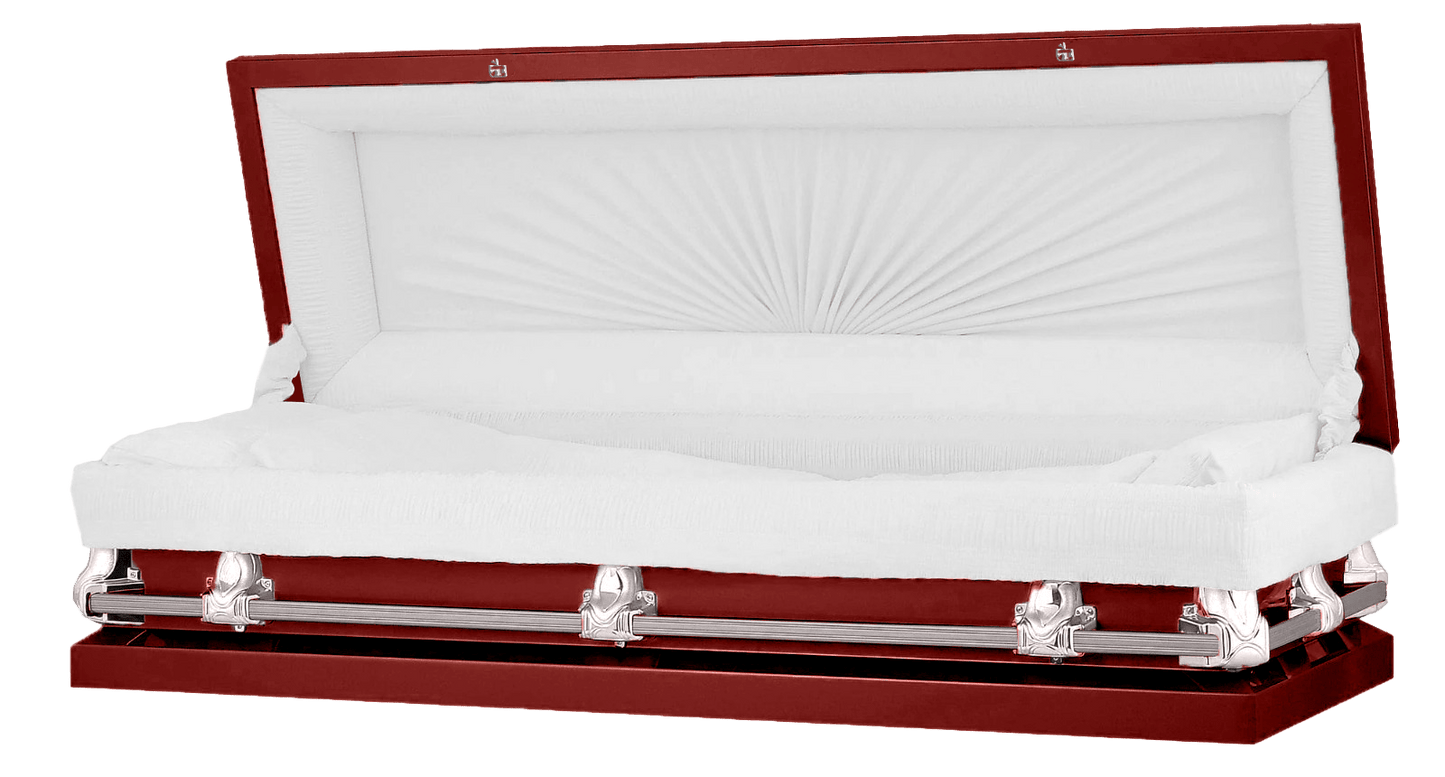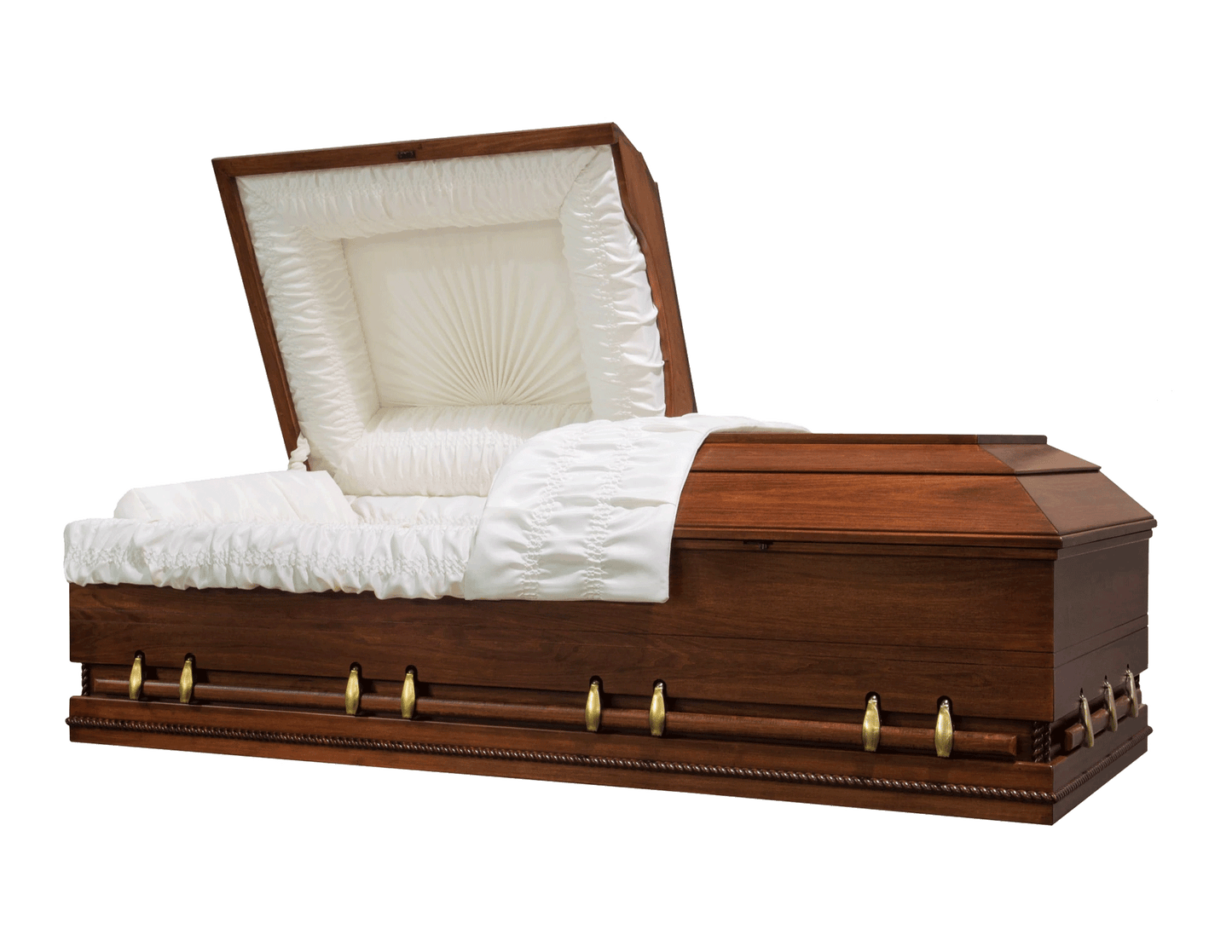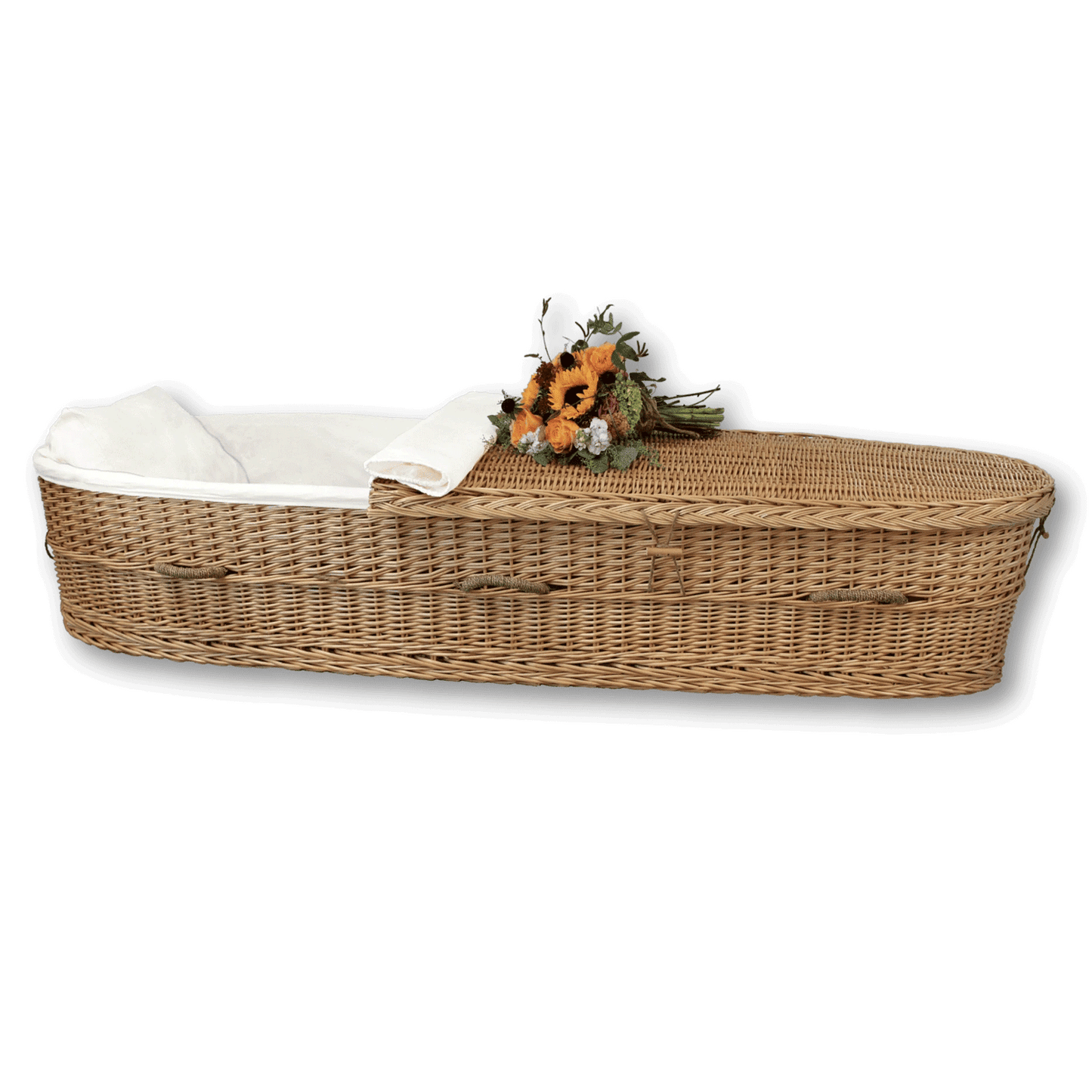Buying a casket is a big decision. For many families, it can feel overwhelming because there are so many choices, and often very little time to decide. This guide is here to make things easier. We’ll walk through everything you need to know, types of caskets, materials, prices, traditions, rules, and more. By the end, you’ll feel confident and ready to choose what’s best for your loved one.
1. What is a Casket?
A casket is a container that holds the body of a loved one for a funeral, viewing, or burial. In the United States, the word “casket” is used more often, while in other countries the word “coffin” is more common.
The Difference Between Casket Vs Coffin:

-
Casket: A rectangular box with four sides and a hinged lid. This is the standard style in the U.S.
-
Coffin: Has six sides, wider at the shoulders and narrower at the feet. This style is seen more often in Europe or in history.
Related Reading: Casket Vs Coffin - Difference Between Casket And Coffin
Families often ask: “Does it matter if I call it a coffin or a casket?” The answer is no, what matters is understanding your choices and picking what feels right for you.
No matter the word you use, the meaning is the same: it is a dignified way to honor a loved one’s final resting place.
2. Types of Caskets
There are different kinds of caskets, and the right choice depends on your family’s wishes, budget, and traditions. Let’s look at each type more closely.
Half-Couch Casket
-
The lid is split into two parts.
-
Only the top half of the body is shown during a viewing.
-
This is the most common style in the U.S.
-
Families often choose this when they want a balance between privacy and tradition.
Full-Couch Casket
-
The lid opens as one piece.
-
The entire body is visible during a viewing.
-
Some families prefer this for cultural or personal reasons.
-
Funeral homes may suggest this if the family wants a fully open presentation.
Sealer (Gasketed) Casket
-
Comes with a rubber seal around the lid.
-
Helps keep out air and moisture.
-
Often chosen when extra protection is wanted or when the body needs to be shipped.
-
More expensive than non-sealer versions.
Non-Sealer Casket
-
Does not include the rubber gasket.
-
More affordable option.
-
Accepted by most cemeteries and funeral homes.
-
A good choice if families prefer simplicity.
Oversized Casket
-
Designed to fit people who need extra space for height or width.
-
Comes in both metal and wood options.
-
Families should check with the cemetery about vault size when choosing this.
Child and Infant Caskets
-
Smaller in size.
-
Made with the same care and respect as adult caskets.
-
Often come in soft colors or simple designs.
Pet Caskets
-
For families who want to bury pets in a special and respectful way.
-
Often simpler in design and size.
-
A way to show love for pets who were part of the family.
Choosing the right type depends on what matters most to your family: presentation at the service, cost, or specific cemetery requirements.
Related Products: What are Different Types of Cremation Urns?
3. Materials Used in Caskets
The material of a casket affects how it looks, how long it lasts, and how much it costs. Each has its own feel and meaning.
Metal Caskets
-
Steel: The most common. Comes in different thickness levels (18-gauge is thicker and stronger, 20-gauge is lighter and more affordable). If budget is a concern, 20-gauge is a practical choice. If durability is important, 18-gauge is better.
-
Stainless Steel: Stronger and more durable than regular steel. It resists rust and can look very polished.
-
Copper: Long-lasting and naturally resistant to rust. It ages beautifully, which many families find meaningful.
-
Bronze: Known for strength and beauty, often considered the highest-end choice. It is also the most expensive.
Wood Caskets
-
Mahogany: Rich color, elegant look, often higher priced. Families who want something timeless often choose this.
-
Cherry: Smooth texture, deep red finish, and classic look.
-
Oak: Strong and traditional, often chosen for its durability and warm tone.
-
Pine: Light-colored wood, simple and affordable. Many families appreciate its natural look.
-
Poplar: Cost-friendly, and can be stained to look like more expensive woods.
- Custom All-Wood Pine Box: This customizable casket is perfect for those seeking a dignified and eco-conscious tribute.
Eco-Friendly Options
-
Wicker or Bamboo: Natural, biodegradable, lightweight, and gentle on the environment.
-
Cardboard: Simple, low-cost, and biodegradable. Often used for cremations or eco-burials.
-
Mushroom Casket: Designed to return safely to the earth by helping the body decompose naturally.
-
Cloth-Covered Casket: Made with basic wood or fiberboard and wrapped in fabric. Affordable and respectful.
Quick tip:
-
Metal = durability and long-term preservation.
-
Wood = warmth, tradition, and natural beauty.
-
Eco = sustainability and returning gently to nature.
When choosing materials, families often think about what reflects their loved one’s personality. A craftsman might be honored with oak, while a nature lover might be best remembered with bamboo or wicker.
4. Inside the Casket
The inside of a casket can be as simple or as detailed as you prefer.
-
Fabrics: Common choices are crepe (light and affordable), satin (smooth and shiny), or velvet (luxurious and soft).
-
Head Panels: The design on the inside lid. Can be plain, tufted, or decorated with embroidery. Families often choose symbols like religious emblems, flowers, or military insignia.

-
Colors: Interiors come in many shades, from white and cream to blue, pink, or even custom colors.
Some families like to match the casket’s interior color to clothing or flowers for the service. You can design your own casket here: Design Your Own Custom Made Casket
5. Size and Fit
Most adult caskets come in a standard size:
-
Length: Around 84 inches (7 feet).
-
Width: Around 28 inches.
-
Height: Around 23 inches.

For people who are taller or broader, oversized caskets are available. These are slightly longer or wider and fit into oversized burial vaults.
Infant, child, and pet caskets are made in smaller sizes.
Tip: If you’re unsure about size, you can always ask the seller or funeral director for guidance. They can help match the right size to your needs.
6. Price and Budget
Caskets can range in price from a few hundred dollars to several thousand.
Average Price Ranges
-
Steel caskets: $1,000–$3,000
-
Stainless steel: $2,000–$4,000
-
Copper or bronze: $3,000–$10,000
-
Wood caskets: $1,200–$5,000 (depending on wood type)
-
Eco-friendly caskets: $500–$1,500
Funeral Home vs Online
-
Funeral homes often charge higher prices because of markups. Families can pay thousands more for the same casket they could buy online.
-
Online sellers, like Titan, provide the same quality at a lower cost. Delivery is fast, and families can see the full catalog of designs.
Why Costs Differ
-
Material: Metal and hardwood cost more than eco options.
-
Features: Gasket seals, embroidery, and custom finishes raise the price.
-
Seller: Funeral homes have overhead costs, while online shops pass savings directly to families.
Ways to Save
-
Choose a non-sealer casket if extra protection isn’t required.
-
Consider eco-friendly or cloth-covered options.
-
Look at payment plans or funeral insurance coverage.
-
Compare online prices before buying at a funeral home.
Remember: A higher price does not always mean more love or respect. What matters most is the meaning behind your choice.
Related Reading: The Complete Guide To Funeral Cost Assistance (And How To Make Smart, Affordable Decisions)
7. Faith and Traditions
Different religions and cultures have specific preferences for caskets.
-
Christian: Both wood and metal caskets are common. Some traditions lean toward specific colors or designs, like white interiors for purity.
-
Jewish: Simple wooden caskets with no metal parts are preferred. This follows the belief of returning to the earth naturally. Nails and glue are avoided when possible.
-
Muslim: Often, a simple shroud is used instead of a casket. Where laws require a casket, it is usually plain wood.
-
Hindu: Cremation is most common, so caskets used are often simple and affordable, just for the purpose of the ceremony.
-
Green Burials: Biodegradable caskets without metal are chosen. Families often prefer wicker, bamboo, or cloth-covered options.
These customs show how burial traditions are deeply personal. Families often balance tradition with personal preference and budget.
8. Rules and Requirements
Every cemetery and state may have different rules. Some common ones include:
-
Burial Vaults or Grave Liners: Many cemeteries require the casket to be placed inside a vault or liner. This keeps the ground from sinking over time.
-
State Laws: In the U.S., there is no law that requires families to buy a casket from a funeral home. You are free to buy online.
-
Funeral Home Acceptance: Funeral homes must accept any casket purchased elsewhere. They cannot refuse it or charge extra handling fees.
-
Transport: If a casket needs to be shipped, make sure the seller offers reliable and fast delivery. Some airlines and freight services require gasketed caskets for shipping.
It’s always best to check with the cemetery before making a final choice, especially for rules about vaults, liners, or eco-friendly burials.
9. Buying Options
There are two main ways to buy a casket:

From a Funeral Home
-
Convenient but usually more expensive.
-
Limited styles available.
-
Families may feel pressured to decide quickly.
From an Online Retailer
-
Lower prices, more variety, and delivery right to the funeral home or cemetery.
-
Transparent pricing helps families avoid hidden costs.
-
Look for trusted sellers with clear pricing, good reviews, and guaranteed delivery times.
Tip: Funeral homes must accept any casket you provide. They cannot charge extra fees for using one bought elsewhere.
10. Green and Sustainable Choices
More families today are choosing eco-friendly caskets. These are made to break down naturally and return to the earth.
Options include wicker, bamboo, cardboard, and mushroom caskets. They cost less than metal or hardwood and are a gentle way to honor both the loved one and the planet.
Eco choices are growing quickly because they:
-
Lower costs.
-
Reduce environmental impact.
-
Align with values of simplicity and natural living.
Let Titan Concierge help you plan with clarity, care, and confidence.
11. Checklist Before You Buy
Here’s a quick list of questions to ask yourself:
-
What type of casket (half-couch, full-couch, etc.) do we want?
-
Which material feels right, metal, wood, or eco-friendly?
-
What is our budget?
-
Does the cemetery have any rules we need to follow?
-
Do we want personalization (like embroidery or color)?
-
How quickly do we need delivery?
-
Do we want a sealer (gasketed) or non-sealer option?
12. Frequently Asked Questions (FAQs)
Q: What’s the difference between a casket and a coffin?
A coffin has six sides and looks wider at the shoulders, while a casket has four sides and is rectangular. In the U.S., caskets are more common.
Q: How much does a casket usually cost?
Most caskets cost between $1,000 and $5,000, depending on material and style. Some high-end ones can cost more.
Q: Do I have to buy a casket from a funeral home?
No. By law, you can buy from any source, including online retailers. Funeral homes must accept it.
Q: Are caskets required by law?
For burial, yes. For cremation, a simple container is usually enough.
Q: What size casket do I need?
Most adults fit standard sizes. Oversized caskets are available for people who need more space.
Q: What’s the cheapest option?
Eco-friendly or cloth-covered caskets are usually the most affordable.
Q: Can a casket be personalized?
Yes. You can choose colors, fabrics, embroidered panels, or even special designs.
Q: How long does delivery take?
Many online retailers offer fast shipping, sometimes within 1–2 days. Always check before buying.
Q: Why are funeral home caskets more expensive?
Funeral homes often add large markups. Online sellers usually offer the same or better quality for less.
Q: Can I pre-purchase a casket?
Yes. Some families buy in advance to save costs and reduce stress later.
Q: What is a rental casket?
For cremations, some funeral homes offer a rental casket for the service. The body is displayed in it, then placed in a simpler container for cremation.
Q: Do cemeteries accept eco-friendly caskets?
Many do, but some require vaults or liners. Always check in advance.
Q: How do I know the casket will arrive on time?
Trusted online sellers provide guaranteed delivery dates. Titan, for example, offers next-day shipping to most places.
Q: Can I see the casket before buying online?
Most online retailers provide detailed pictures, videos, and customer reviews to help you decide.
Q: What if the casket is damaged in shipping?
Reliable sellers replace it quickly at no extra cost. Always check the return and guarantee policy.
Conclusion
Choosing a casket is never easy, but it doesn’t have to be confusing. With the right information, you can make a choice that feels respectful, loving, and right for your family.
Whether you prefer metal, wood, or eco-friendly options, remember that every casket serves the same purpose: to honor and protect a loved one.
At Titan, we’re here to help guide you through the process with clear choices, affordable prices, and fast delivery, so you can focus on what truly matters: remembering and celebrating a life well lived.

![Upgrade to Premium Weight [18-gauge steel]](http://titancasket.com/cdn/shop/products/casketthicknesswithnumbers.png?v=1680642906&width=533)





